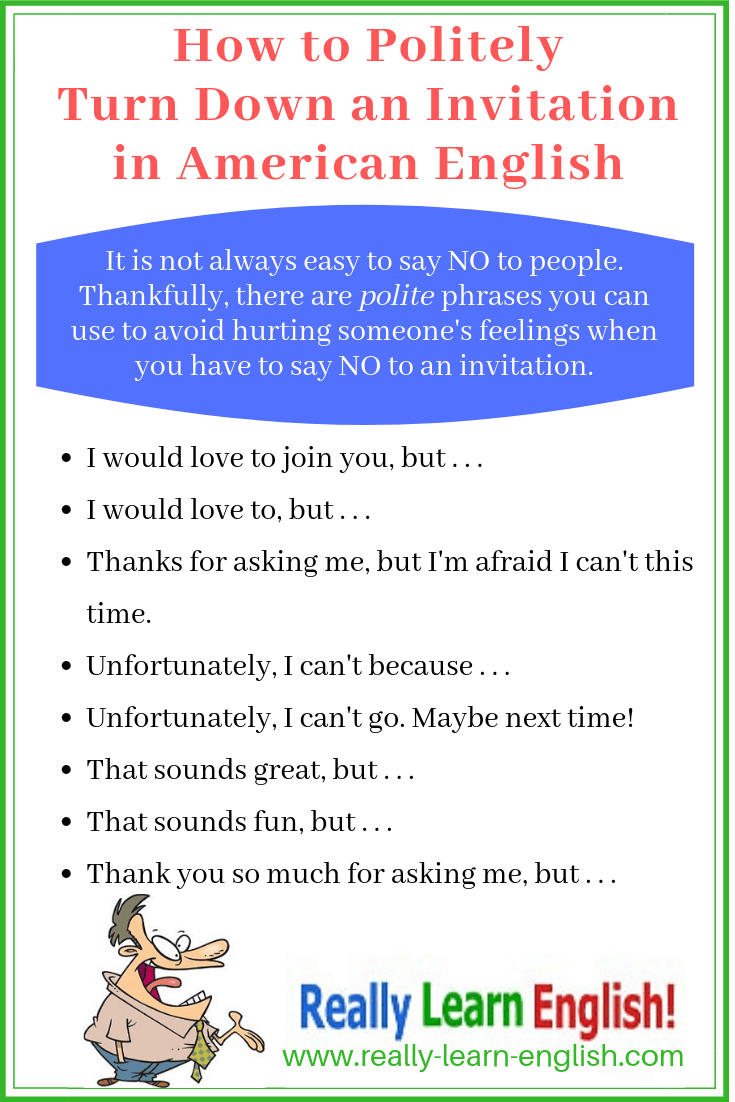How to Be Polite in English
When you are just starting to learn English, your main goal is to be understood. It is also important that you do not sound rude or unprofessional.

There are many words and phrases in English that you can use to be nice and polite. You probably already know the most common polite words and phrases in English: please, thank you, excuse me, and you're welcome.
Click Here for Step-by-Step Rules, Stories and Exercises to Practice All English Tenses
The English language is full of polite words and phrases. When you begin speaking English, most people will realize that any impoliteness by you is not intentional. But it is important to learn correct English customs, so you can make the best possible impression when you meet new people.
You do not want to sound rude in formal situations like job interviews or meetings with clients and coworkers. It is also important to be polite when requesting information or asking for help.
In this lesson, you will learn ways to be polite in English. These tips will help you avoid sounding rude when making requests or asking for help.
Some of these tips might surprise you or seem strange, but this lesson is important. Knowing how to be polite in English will help you in many ways!
Being polite in English may help you:
- make a good impression when you meet someone new
- create a positive reputation
- be more successful in conversations
- avoid offending others
- build positive relationships more easily
- get information that you need
Please, thank you, excuse
me, and you're welcome in English
Please, Thank You, Excuse Me, and You're Welcome are
four of the most
common polite expressions in English. You can use these phrases
in formal and informal situations. 1. "Please" = Used in polite requests or questions
- Please
close the door.
- Would you please
close
the door.
- Can you close the door, please?
- Close the door, please.
2. "Thank You" = A polite expression used to acknowledge a gift, service, or compliment; it is also used when accepting or refusing an offer
- No, thank you.
- Thank you
for the gift.
- Thanks for helping me!
There are several ways to say thank you in English. Depending on the situation, you can use these expressions:
- Thanks a lot!
- Thank you very much.
- That's very kind of you.
- Thanks. I appreciate your help.
- Thank you for your time.
- That's very kind of you.
- Many thanks!
3. "Excuse me" = a polite phrase used in many situations: to get someone's attention, to ask someone to move out of the way, to interrupt
Excuse me is a phrase that is used in many situations. It is very rude to tell someone to, "Get out of the way." Instead, say, "Excuse me" as a polite way to ask someone to move out of the way, so you can walk by.
If you want to get someone's attention, you can say, "Excuse me." In a classroom, you can raise your hand and say, "Excuse me" to get your teacher's attention. This is also a polite way to interrupt or disagree with a speaker.
- Excuse me,
but I do not
understand.
- Excuse me,
can you repeat
what you just said?
- Excuse me,
I have a
question.
- Excuse me, I do not agree with your statement.
4. "You are welcome / You're welcome" = a polite response to "thanks"
When you do something nice and the other person says, "Thanks", you can respond with, "You're welcome."

Making
requests in English
& Replacing commands with questions
People do not like to be told what to do. When we want to tell someone
to do something, we can use commands. Commands are appropriate in
certain situations, but to avoid sounding rude, you can replace commands
with polite questions. Don't say, "Give me a cup of tea."
Do say, "May I have a cup of tea?"
Don't say, "Open the window."
Do say, "Can you please open the window?"
In English, when we ask for something or what someone to do something, we often use modal verbs like could, might, would, should, can, and may to sound more polite. You can also include the word "please".
- Would
you please
pass the salt?
- Do you think you could
finish the assignment today?
- Would
you mind handing me
that book?
- I would appreciate it if you could
turn the music down.
- May
I ask you a question?
- Would
you please
tell me where the bathroom is
located?
- Can you please help me with these bags?

Using negative questions to give advice or make recommendations in English
In formal conversations, you can use negative questions to politely give advice, express your opinion, or make recommendations. A negative question changes strong language into soft language and sounds more polite. Here are some examples of negative questions.Don't say, "You need to fix the spelling in this document."
Do say, "Don't you think this document would be more professional if all of the spelling was correct?"
Don't say, "You should spend more time practicing your English."
Do say, "Shouldn't you spend more time practicing your English?"
Don't say, "This would be better if you typed it."
Do say, "Would this look better if it was typed?"
Disagreeing politely in English
It is okay to disagree with someone. If you have to disagree with someone, you should do it politely. Show respect for their opinions and thoughts. These phrases will help you disagree and express your opinion without sounding rude.- I understand what you are saying, but...
- I see what you mean, but...
- I respect your opinion, but...
- I see your point, but I disagree because...
- You might be right, but...

Turning down an invitation in English
It is not always easy to say no to people. Thankfully, there are polite phrases you can use to avoid hurting someone's feelings when you have to say no to an invitation.- I would love to join you, but...
- I would love to, but...
- Thanks for asking me, but I'm afraid I can't this time.
- Unfortunately, I can't because...
- Unfortunately, I can't go. Maybe next time!
- That sounds great, but...
- That sounds fun, but...
- Thank you so much for asking me, but...

Not
understanding - Asking
to repeat information in English
When you don't understand what someone says, you can ask them to repeat
what they said. Sometimes people speak too quickly or quietly, or there
is too much noise. However, it is more polite to blame yourself than
the speaker. Here are some ways to say you did not understand:
- Excuse me?
- Pardon me?
- Could you please repeat that?
- I'm sorry. I didn't quite catch that.
- Could you say that again, please?
- Would you mind repeating what you said?
- I'm sorry. I didn't hear you.
- I'm sorry. I didn't understand that.
- I'm sorry. I wasn't listening. Could you please repeat that?
- Excuse me. I did not hear what you said.
Get Updates, Special Offers, and English Resources
Download your FREE GIFT (the first two chapters of
English Short Stories Book and Workbook)
as soon as you join!

By submitting your email, you consent to receiving updates and newsletters from us and to the sharing of your personal data with third parties for the purposes of sending you communications. We will not spam you. You can unsubscribe at any time. For more information, please see our privacy policy.
Return
from How to be Polite in English to Free! Learn to Speak English





